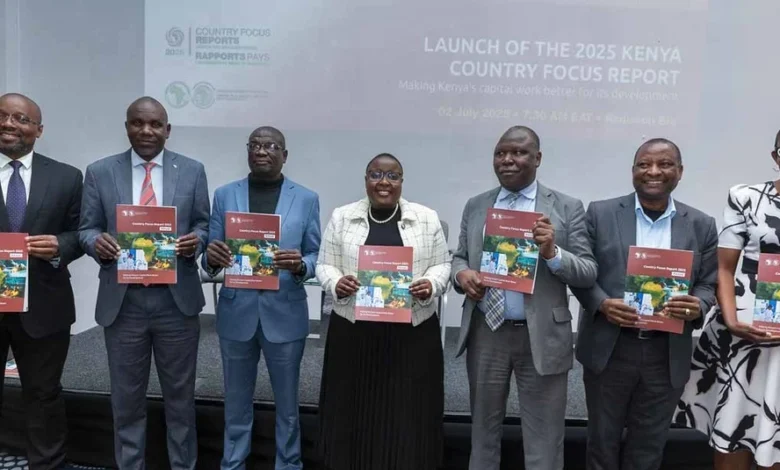
The African Development Bank Group (AfDB) has released a new Country Focus Report (CFR) challenging Kenya to accelerate key reforms to better mobilize and deploy its own capital for development.
The report, “Making Kenya’s Capital Market Work Better for its Development”, outlines roadmap for transforming Kenya’s economy through improved fiscal management, financial sector deepening, and human capital investment.
According to the report, Kenya’s economy grew by 4.6% in 2024, outperforming the global average of 3.3% despite weak industrial activity, subdued investment, and ongoing climate-related shocks.
The CFR projects that economic growth could reach 5.3% in 2025, driven by stronger agricultural productivity, a growing services sector, and continued implementation of the Bottom-Up Economic Transformation Agenda.
Speaking during the launch of the report, Dr. Kenrick Ayot, senior deputy director at the National Treasury, praised the progress already made in stabilizing key macroeconomic indicators.
“The strong growth reflects the impact of sound and deliberate policies as well as the resilience of our well-diversified economy,” he said.
Ayot also noted an improvement in inflation, which dropped from 9.6% in 2022 to 3.8% in May 2025, and an appreciation of the Kenyan shilling from Ksh.159.7/USD in early 2024 to Ksh.129.3/USD by mid-2025.
However, despite this progress, the report flagged several deep-rooted structural challenges, including the county’s capital which remains underutilized and unevenly distributed, with issues such as high public debt, limited financial access for small businesses, degraded natural capital, and poor learning outcomes.
Also Read: Kenya Loses $1.5 Billion Annually to Corruption, Says AfDB
Caroline Ntumwa, the Bank’s Country Economist for Kenya, said the country could do better if it focussed more on capital deployment.
“Kenya has made progress in infrastructure and financial access, but weaknesses in capital deployment, especially in human and natural capital, continue to slow development,” she said.
AfDB Recommendations
Broadening the tax base has proved to be a challenged for the Kenya’s successive governemnt, the latest being the Finance Bill, 2024 which triggered unrest among youthful Kenyans over overtaxation.
The government aimed to raise Ksh.302 billion through various proposed taxes in the controversial Bill. It was later dropped by President William Ruto following deadly protests on June 25, 2025.
More than 60 people died in protest to high taxation.
The CFR suggests the country could chat a different path to expand tax bracket through digital systems and informal sector integration, improving access to affordable credit.
It could also leverage scaling value addition in agriculture and mining, and aligning education with future job markets, particularly in green growth, manufacturing, and digital innovation.
The report also calls for stronger public-private partnerships, inclusive capital strategies, and institutional reforms to foster long-term, equitable development.






We’re a gaggle of volunteers and opening a brand new scheme in our community. Your site provided us with valuable info to paintings on. You have performed a formidable activity and our whole community will be grateful to you.
Wonderful website. Lots of helpful information here. I¦m sending it to some pals ans also sharing in delicious. And obviously, thanks to your sweat!
I’m really loving the theme/design of your site. Do you ever run into any browser compatibility problems? A couple of my blog readers have complained about my website not working correctly in Explorer but looks great in Safari. Do you have any ideas to help fix this issue?
hey there and thank you for your info – I’ve certainly picked up anything new from right here. I did however expertise several technical issues using this website, since I experienced to reload the website many times previous to I could get it to load properly. I had been wondering if your hosting is OK? Not that I am complaining, but sluggish loading instances times will very frequently affect your placement in google and can damage your high-quality score if ads and marketing with Adwords. Anyway I’m adding this RSS to my email and can look out for a lot more of your respective interesting content. Ensure that you update this again soon..
I have not checked in here for some time as I thought it was getting boring, but the last few posts are good quality so I guess I’ll add you back to my everyday bloglist. You deserve it my friend 🙂